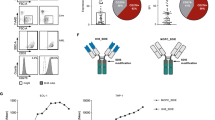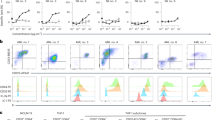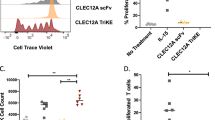Abstract
Antibody-dependent cellular cytotoxicity (ADCC) of natural killer (NK) cells largely contributes to the success of monoclonal antibody (mAb) treatment in cancer. As no antibodies are clinically available for immunotherapy of myeloid leukemias (MLs), we aimed to develop an Fc-optimized CD133 mAb for induction of NK ADCC against MLs. When comparing different available CD133 mAbs, no difference was observed with regard to binding to primary chronic myeloid leukemia cells. However, clone 293C3 recognized acute myeloid leukemia (AML) cells in a substantially higher percentage of patient cases and was thus chosen to generate chimeric mAbs with either wild-type Fc part (293C3-WT) or a variant containing amino-acid exchanges (S239D/I332E) to enhance affinity to CD16 on NK cells (293C3-SDIE). In vitro, treatment with 293C3-SDIE significantly enhanced activation, degranulation and lysis of primary CD133-positive AML cells by allogeneic and autologous NK cells as compared with its wild-type counterpart. In line with the observed lower expression levels of CD133 on healthy cells compared with malignant hematopoietic cells, 293C3-SDIE caused no relevant toxicity towards committed hematopoietic progenitor cells. In a NOD.Cg-PrkdcscidIL2rgtmWjl/Sz xenotransplantation model, 293C3-SDIE facilitated elimination of patient AML cells by human NK cells. Thus, 293C3-SDIE constitutes an attractive immunotherapeutic compound, in particular for elimination of minimal residual disease in the context of allogeneic stem cell transplantation in AML.
This is a preview of subscription content, access via your institution
Access options
Subscribe to this journal
Receive 12 print issues and online access
$259.00 per year
only $21.58 per issue
Buy this article
- Purchase on Springer Link
- Instant access to full article PDF
Prices may be subject to local taxes which are calculated during checkout





Similar content being viewed by others
References
Keating GM . Rituximab: a review of its use in chronic lymphocytic leukaemia, low-grade or follicular lymphoma and diffuse large B-cell lymphoma. Drugs 2010; 70: 1445–1476.
Arteaga CL, Sliwkowski MX, Osborne CK, Perez EA, Puglisi F, Gianni L . Treatment of HER2-positive breast cancer: current status and future perspectives. Nat Rev Clin Oncol 2012; 9: 16–32.
Shinkawa T, Nakamura K, Yamane N, Shoji-Hosaka E, Kanda Y, Sakurada M et al. The absence of fucose but not the presence of galactose or bisecting N-acetylglucosamine of human IgG1 complex-type oligosaccharides shows the critical role of enhancing antibody-dependent cellular cytotoxicity. J Biol Chem 2003; 278: 3466–3473.
Lazar GA, Dang W, Karki S, Vafa O, Peng JS, Hyun L et al. Engineered antibody Fc variants with enhanced effector function. Proc Natl Acad Sci USA 2006; 103: 4005–4010.
Goede V, Fischer K, Busch R, Engelke A, Eichhorst B, Wendtner CM et al. Obinutuzumab plus chlorambucil in patients with CLL and coexisting conditions. N Engl J Med 2014; 370: 1101–1110.
Horton HM, Bernett MJ, Pong E, Peipp M, Karki S, Chu SY et al. Potent in vitro and in vivo activity of an Fc-engineered anti-CD19 monoclonal antibody against lymphoma and leukemia. Cancer Res 2008; 68: 8049–8057.
Horton HM, Bernett MJ, Peipp M, Pong E, Karki S, Chu SY et al. Fc-engineered anti-CD40 antibody enhances multiple effector functions and exhibits potent in vitro and in vivo antitumor activity against hematologic malignancies. Blood 2010; 116: 3004–3012.
Vivier E, Tomasello E, Baratin M, Walzer T, Ugolini S . Functions of natural killer cells. Nat Immunol 2008; 9: 503–510.
Seidel UJ, Schlegel P, Lang P . Natural killer cell mediated antibody-dependent cellular cytotoxicity in tumor immunotherapy with therapeutic antibodies. Front Immunol 2013; 4: 76.
Moretta L, Locatelli F, Pende D, Sivori S, Falco M, Bottino C et al. Human NK receptors: from the molecules to the therapy of high risk leukemias. FEBS Lett 2011; 585: 1563–1567.
Ruggeri L, Capanni M, Urbani E, Perruccio K, Shlomchik WD, Tosti A et al. Effectiveness of donor natural killer cell alloreactivity in mismatched hematopoietic transplants. Science 2002; 295: 2097–2100.
Feldman EJ, Brandwein J, Stone R, Kalaycio M, Moore J, O'Connor J et al. Phase III randomized multicenter study of a humanized anti-CD33 monoclonal antibody,lintuzumab, in combination with chemotherapy, versus chemotherapy alone in patients with refractory or first-relapsed acute myeloid leukemia. J Clin Oncol 2005; 23: 4110–4116.
Roberts AW, He S, Ritchie D, Hertzberg MS, Kerridge I, Durrant ST et al. A phase I study of anti-CD123 monoclonal antibody (mAb) CSL360 targeting leukemia stem cells (LSC) in AML. J Clin Oncol 2010; 28 (Suppl. e13012) Abstract 15.
Grosse-Gehling P, Fargeas CA, Dittfeld C, Garbe Y, Alison MR, Corbeil D et al. CD133 as a biomarker for putative cancer stem cells in solid tumours: limitations, problems and challenges. J Pathol 2013; 229: 355–378.
Wuchter C, Ratei R, Spahn G, Schoch C, Harbott J, Schnittger S et al. Impact of CD133 (AC133) and CD90 expression analysis for acute leukemia immunophenotyping. Haematologica 2001; 86: 154–161.
Schmiedel BJ, Arélin V, Gruenebach F, Krusch M, Schmidt SM, Salih HR . Azacytidine impairs NK cell reactivity while decitabine augments NK cell responsiveness toward stimulation. Int J Cancer 2011; 128: 2911–2922.
Fujisaki H, Kakuda H, Shimasaki N, Imai C, Ma J, Lockey T et al. Expansion of highly cytotoxic human natural killer cells for cancer cell therapy. Cancer Res 2009; 69: 4010–4017.
Hofmann M, Große-Hovest L, Nübling T, Pyż E, Bamberg ML, Aulwurm S et al. Generation, selection and preclinical characterization of an Fc-optimized FLT3 antibody for the treatment of myeloid leukemia. Leukemia 2012; 26: 1228–1237.
Bühring H, Marxer A, Lammers R, Wissinger B . CD133 cluster report. In: Mason DY (eds) Leucocyte Typing, 7th edn. Oxford University Press: London, UK, 2002, pp 622–623.
Mason D, André P, Bensussan A, Buckley C, Civin C, Clark E et al. CD antigens 2001. J Leukocyte Biol 2001; 70: 685–690.
Steinbacher J, Baltz-Ghahremanpour K, Schmiedel BJ, Steinle A, Jung G, Kübler A et al. An Fc-optimized NKG2D-IgG fusion protein for induction of NK cell reactivity against leukemia. Int J Cancer 2015; 136: 1073–1084.
Herrmann T, Grosse-Hovest L, Otz T, Krammer PH, Rammensee HG, Jung G . Construction of optimized bispecific antibodies for selective activation of the death receptor CD95. Cancer Res 2008; 68: 1221–1227.
Woiterski J, Ebinger M, Witte KE, Goecke B, Heininger V, Philippek M et al. Engraftment of low numbers of pediatric acute lymphoid and myeloid leukemias into NOD/SCID/IL2Rcγnull mice reflects individual leukemogenecity and highly correlates with clinical outcome. Int J Cancer 2013; 133: 1547–1556.
Kübler A, Woiterski J, Witte KE, Bühring HJ, Hartwig UF, Ebinger M et al. Both mature KIR+ and immature KIR- NK cells control pediatric acute B-cell precursor leukemia in NOD.Cg-Prkdcscid IL2rgtmWjl/Sz mice. Blood 2014; 124: 3914–3923.
Armour KL, Clark MR, Hadley AG, Williamson LM . Recombinant human IgG molecules lacking Fc gamma receptor I binding and monocyte triggering activities. Eur J Immunol 1999; 29: 2613–2624.
Bowles JA, Weiner GJ . CD16 polymorphisms and NK activation induced by monoclonal antibody-coated target cells. J Immunol Methods 2005; 304: 88–99.
Ljunggren HG, Malmberg KJ . Prospects for the use of NK cells in immunotherapy of human cancer. Nat Rev Immunol 2007; 7: 329–339.
Weiner GJ . Rituximab: mechanism of action. Semin Hematol 2010; 47: 115–123.
Ginaldi L, De Martinis M, Matutes E, Farahat N, Morilla R, Catovsky D . Levels of expression of CD19 and CD20 in chronic B cell leukaemias. J Clin Pathol 1998; 51: 364–369.
Salih HR, Hofmann M, Grosse-Hovest L, Nuebling T, Bamberg M, Aulwurm S et al. Elimination of minimal residual disease (MRD) in aml patients with a novel Fc-optimized FLT3 antibody (4G8-SDIEM). Blood 2013; 122: Abstract 1454.
Huang J, Li C, Wang Y, Lv H, Guo Y, Dai H et al. Cytokine-induced killer (CIK) cells bound with anti-CD3/anti-CD133 bispecific antibodies target CD133(high) cancer stem cells in vitro and in vivo. Clin Immunol 2013; 149: 156–168.
Prasad S, Gaedicke S, Machein M, Mittler G, Braun F, Hettich M et al. Effective eradication of glioblastoma stem cells by local application of an AC133/CD133-Specific T-cell-engaging antibody and CD8 T cells. Cancer Res 2015; 75: 2166–2176.
Koene HR, Kleijer M, Algra J, Roos D, dem Borne AE, de Haas M . Fc gammaRIIIa-158V/F polymorphism influences the binding of IgG by natural killer cell Fc gammaRIIIa, independently of the Fc gammaRIIIa-48 L/R/H phenotype. Blood 1997; 90: 1109–1114.
Unkeless JC, Scigliano E, Freedman VH . Structure and function of human and murine receptors for IgG. Annu Rev Immunol 1988; 6: 251–281.
Nimmerjahn F, Ravetch JV . Fcgamma receptors as regulators of immune responses. Nat Rev Immunol 2008; 8: 34–47.
Bruhns P . Properties of mouse and human IgG receptors and their contribution to disease models. Blood 2012; 119: 5640–5649.
Albanesi M, Mancardi DA, Jönsson F, Iannascoli B, Fiette L, Di Santo JP et al. Neutrophils mediate antibody-induced antitumor effects in mice. Blood 2013; 122: 3160–3164.
Yin AH, Miraglia S, Zanjani ED, Almeida-Porada G, Ogawa M, Leary AG et al. AC133, a novel marker for human hematopoietic stem and progenitor cells. Blood 1997; 90: 5002–5012.
Handgretinger R, Gordon PR, Leimig T, Chen X, Buhring HJ, Niethammer D et al. Biology and plasticity of CD133+ hematopoietic stem cells. Ann NY Acad Sci 2003; 996: 141–151.
Giebel S, Stella-Holowiecka B, Krawczyk-Kulis M, Gökbuget N, Hoelzer D, Doubek M et alStudy Group for Adult ALL of the European Leukemia Net.. Status of minimal residual disease determines outcome of autologous hematopoietic SCT in adult ALL. Bone Marrow Transplant 2010; 45: 1095–1101.
Acknowledgements
This work was supported by Deutsche Forschungsgemeinschaft (SA1360/7-3, SA1360/9-1), Deutsche José Carreras Leukämie-Stiftung (R14/19) and Deutsche Krebshilfe (111828, 111134).
Author information
Authors and Affiliations
Corresponding author
Ethics declarations
Competing interests
The authors declare no conflict of interest.
Additional information
Supplementary Information accompanies this paper on the Leukemia website
Rights and permissions
About this article
Cite this article
Koerner, S., André, M., Leibold, J. et al. An Fc-optimized CD133 antibody for induction of NK cell reactivity against myeloid leukemia. Leukemia 31, 459–469 (2017). https://doi.org/10.1038/leu.2016.194
Received:
Revised:
Accepted:
Published:
Issue Date:
DOI: https://doi.org/10.1038/leu.2016.194
This article is cited by
-
Functional Roles of CD133: More than Stemness Associated Factor Regulated by the Microenvironment
Stem Cell Reviews and Reports (2024)
-
Natural killer cells and acute myeloid leukemia: promises and challenges
Cancer Immunology, Immunotherapy (2022)
-
Natural killer cell-based immunotherapy for acute myeloid leukemia
Journal of Hematology & Oncology (2020)
-
Absence of NKG2D ligands defines leukaemia stem cells and mediates their immune evasion
Nature (2019)
-
Restoration of natural killer cell cytotoxicity in the suppressive tumor microenvironment: novel approaches to treat AML
Journal of Hematopathology (2017)



